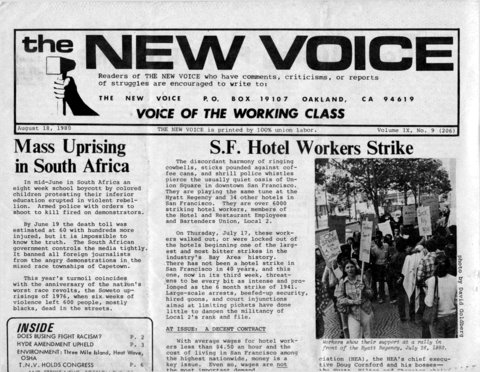
Published: The New Voice, Vol. IX, No. 9, August 18, 1980.
Transcription, Editing and Markup: Paul Saba
Copyright: This work is in the Public Domain under the Creative Commons Common Deed. You can freely copy, distribute and display this work; as well as make derivative and commercial works. Please credit the Encyclopedia of Anti-Revisionism On-Line as your source, include the url to this work, and note any of the transcribers, editors & proofreaders above.
The New Voice held a congress this year. Delegates examined TNV’s political work among the people, the threat of world war three, and the struggles against racism and sexism.
The New Voice’s general line for work among the people is the second of its three key points: Make the workers’ struggles the Party’s struggles, and make the Party’s outlook the workers’ outlook. The congress agreed that each TNV local unit needs to pay stricter attention when doing mass work and building a base in the working class to the method of carrying out a focus. A focus requires that we choose among all the struggles and situations we might get involved in. It also requires specific goals for the work in an arena. The process consists of consciously picking a focus, working on it, monitoring results closely, and revising the focus. From time to time all of TNV will take up one focus, as it did with the successful campaign to overturn the Weber case, which threatened affirmative action programs in all industries.
The congress approved the general line TNV has been following to counter the threat of world war three. It affirmed that the principal contradiction in the world today is the contradiction between the Soviet imperialists and the rest of the world. At the same time the congress upheld a number of points dealing with the ultimate aim of revolution in the United States and with the aspects of struggle and potential alliance with the U.S. ruling class. While the congress analyzed the world situation in terms of the principal contradiction with the Soviet Union, it rejected the method of primarily seeking an alliance or united front between the U.S. bourgeoisie and proletariat. The path toward such an alliance and its form cannot be known at this time.
The struggle against racist oppression and division remains a key contradiction in the United States. The New Voice has increased its attention to this problem, achieving a more effective, practical grasp of the issues and tasks involved in the anti-racist struggle. This development will continue. Peoples oppressed by racism and national minority oppression will find real and dedicated support for their struggles coming from The New Voice. The organization will also work in a flexible, positive way to achieve greater unity of all workers, whatever their color or national origin, to wage the struggle against racism and national oppression.
The congress gave considerable attention to the fight against the oppression of women. Delegates achieved a greater awareness of the forms of sexism and laid the basis for TNV to make increased contributions to the anti-sexist, struggle. The oppression of women is economic, social, political, physical, cultural and ideological. This struggle has its own unique forms and demands; it is not exactly like the anti-racist struggle.
Organization-wide discussions held in the period prior to the congress contributed to its success. Any TNV member could submit any proposal, resolution or discussion in written form to be circulated among the entire organization. The delegates, who came from units throughout the country, made decisions which will be implemented by all members under TNV’s leading body. This is the democratic centralist method.
The New Voice, a Marxist-Leninist organization, stands ready to unite with other communist groups. The United States still does not have a unified genuine communist party. The New Voice has held discussions with other communist groups and is in contact with some groups at this time. TNV accepts critical review of its line in discussion with others, makes principled proposals, and is nonsectarian, noncareerist and flexible on secondary matters. The Congress affirmed TNV’s interest in Party-level organizational unity on the left.
A comradely spirit characterized the congress in both formal and informal activities. Delegates derived a sense of mutual support, unity, and common dedication to our revolutionary cause. The decisions, plans and spirit of the congress should now be carried to every part of the organization for study and practical realization in all activities.